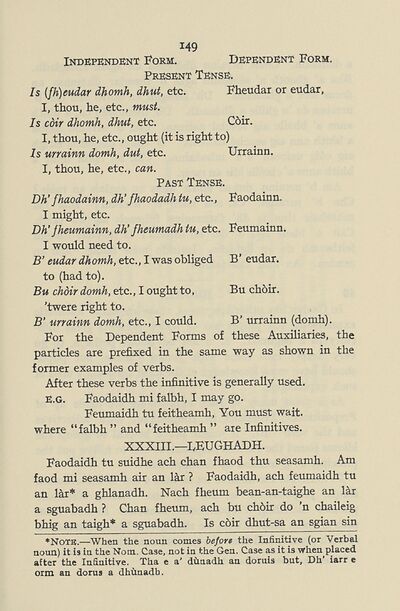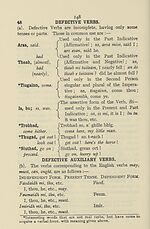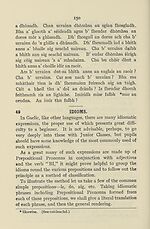Download files
Complete book:
Individual page:
Thumbnail gallery: Grid view | List view

149
Independent Form. Dependent Form.
Present Tense.
Is (fh)eudar dhomh, dhut, etc. Fheudar or eudar,
I, thou, he, etc., must.
Is cdir dhomh, dhut, etc. Coir.
I, thou, he, etc., ought (it is right to)
Is urrainn domh, dut, etc. Urrainn.
I, thou, he, etc., can.
Past Tense.
Dh’ fhaodainn, dh’ fhaodadh tu, etc., Faodainn.
I might, etc.
Dh’ jheumainn, dh’ fheumadh tu, etc. Feumainn.
I would need to.
B’ eudar dhomh, etc., I was obliged B’ eudar.
to (had to).
Bu chdir domh, etc., I ought to, Bu choir.
'twere right to.
B’ urrainn domh, etc., I could. B’ urrainn (domh).
For the Dependent Forms of these Auxiliaries, the
particles are prefixed in the same way as shown in the
former examples of verbs.
After these verbs the infinitive is generally used.
E.G. Faodaidh mi falbh, I may go.
Feumaidh tu feitheamh, You must wait,
where “falbh ” and “feitheamh ’’ are Infinitives.
XXXIII.—DEUGHADH.
Faodaidh tu suidhe ach chan fhaod thu seasamh. Am
faod mi seasamh air an lar ? Faodaidh, ach feumaidh tu
an lar* a ghlanadh. Nach fheum bean-an-taighe an \kx
a sguabadh ? Chan fheum, ach bu choir do ’n chaileig
bhig an taigh* a sguabadh. Is coir dhut-sa an sgian sin
*NoTB.—When the noun comes before the Infinitive (or verbal
noun) it is in the Norn. Case, not in the Gen. Case as it is when placed
after the Infinitive. Tha e a' dunadh an doruis but, Dh’ iarr e
orm an dorus a dhunadb.
Independent Form. Dependent Form.
Present Tense.
Is (fh)eudar dhomh, dhut, etc. Fheudar or eudar,
I, thou, he, etc., must.
Is cdir dhomh, dhut, etc. Coir.
I, thou, he, etc., ought (it is right to)
Is urrainn domh, dut, etc. Urrainn.
I, thou, he, etc., can.
Past Tense.
Dh’ fhaodainn, dh’ fhaodadh tu, etc., Faodainn.
I might, etc.
Dh’ jheumainn, dh’ fheumadh tu, etc. Feumainn.
I would need to.
B’ eudar dhomh, etc., I was obliged B’ eudar.
to (had to).
Bu chdir domh, etc., I ought to, Bu choir.
'twere right to.
B’ urrainn domh, etc., I could. B’ urrainn (domh).
For the Dependent Forms of these Auxiliaries, the
particles are prefixed in the same way as shown in the
former examples of verbs.
After these verbs the infinitive is generally used.
E.G. Faodaidh mi falbh, I may go.
Feumaidh tu feitheamh, You must wait,
where “falbh ” and “feitheamh ’’ are Infinitives.
XXXIII.—DEUGHADH.
Faodaidh tu suidhe ach chan fhaod thu seasamh. Am
faod mi seasamh air an lar ? Faodaidh, ach feumaidh tu
an lar* a ghlanadh. Nach fheum bean-an-taighe an \kx
a sguabadh ? Chan fheum, ach bu choir do ’n chaileig
bhig an taigh* a sguabadh. Is coir dhut-sa an sgian sin
*NoTB.—When the noun comes before the Infinitive (or verbal
noun) it is in the Norn. Case, not in the Gen. Case as it is when placed
after the Infinitive. Tha e a' dunadh an doruis but, Dh’ iarr e
orm an dorus a dhunadb.
Set display mode to:
![]() Universal Viewer |
Universal Viewer | ![]() Mirador |
Large image | Transcription
Mirador |
Large image | Transcription
| An Comunn Gàidhealach > An Comunn Gàidhealach Publications > Elementary course of Gaelic > (161) |
|---|
| Permanent URL | https://digital.nls.uk/196028893 |
|---|
| Description | This contains items published by An Comunn, which are not specifically Mòd-related. It includes journals, annual reports and corporate documents, policy statements, educational resources and published plays and literature. It is arranged alphabetically by title. |
|---|
| Description | A collection of over 400 items published by An Comunn Gàidhealach, the organisation which promotes Gaelic language and culture and organises the Royal National Mòd. Dating from 1891 up to the present day, the collection includes journals and newspapers, annual reports, educational materials, national Mòd programmes, published Mòd literature and music. |
|---|---|
| Additional NLS resources: |
|

